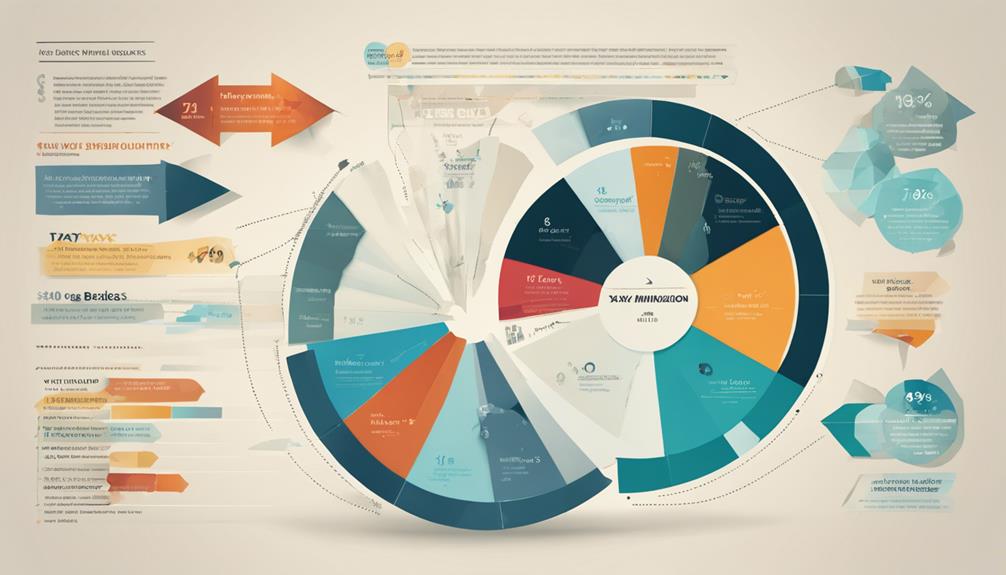When you receive a bonus, it's important to understand how it's taxed, as this can substantially impact your take-home pay. Depending on your overall income, bonuses are subject to a flat tax withholding rate that can range from 22% to 37%. This means the method your employer uses for withholding can either help or hinder your financial situation. But don't worry; there are strategies to minimize your tax liability. Curious about how you can optimize your bonus income and keep more in your pocket? Let's explore some effective approaches.
Key Takeaways
- Understand the difference between flat rate (22%) and aggregate methods to optimize withholding on your bonus.
- Consider timing your bonus to avoid pushing income into a higher tax bracket.
- Maximize retirement contributions to defer taxes on your bonus income.
- Utilize itemized deductions and tax credits to lower your overall taxable income.
- Consult a tax professional for personalized strategies based on your financial situation.
Understanding Bonus Tax Rate

When it comes to bonuses, many people don't realize how they're taxed differently from regular income. Comprehending the bonus tax rate is imperative for maximizing your take-home pay. Bonuses are subject to a unique bonus rate structure, which can impact your overall tax liability.
Employers often use different bonus calculation methods to determine how much tax to withhold from your bonus. One common method is the percentage method, where a flat rate is applied to your bonus amount. As of 2023, this rate is typically around 22%. Alternatively, employers might use the aggregate method, where your bonus is added to your most recent paycheck, and taxes are withheld based on your total earnings for that pay period. This can sometimes lead to higher withholding if you're in a higher tax bracket.
Grasping these methods can help you better anticipate how much of your bonus you'll actually take home. Knowing the bonus rate structure allows you to plan accordingly and make more informed financial decisions. By being aware of how bonuses are taxed, you can strategize to minimize your tax burden and enjoy more of your hard-earned extra income.
How Bonuses Are Taxed
Understanding how bonuses are taxed is pivotal for maximizing your earnings. The IRS has specific bonus taxation rules that differ from regular income. Generally, bonuses are considered supplemental income and subject to a flat withholding rate, which is often higher than your usual tax rate. This flat tax rate can range from 22% to 37%, depending on your overall income.
Your employer may use various bonus pay structures when determining how to handle your bonus. For instance, your bonus could be combined with your regular paycheck, leading to a higher tax withholding based on your total earnings for that pay period. Alternatively, it might be paid as a separate check, allowing for the flat withholding rate to apply.
It's essential to understand these distinctions because they can greatly affect your take-home pay. By being informed about bonus taxation rules and how your employer structures your bonus, you can make better financial decisions. Planning ahead can help you adjust your withholdings or even contribute to retirement accounts to offset some of the tax impacts. Maximizing your earnings means understanding how your bonuses will be taxed before they hit your bank account.
Withholding Methods Explained

When it comes to withholding methods for your bonus, you've got two main options: the percentage method and the aggregate method. Each has its own benefits, and understanding these can help you make smarter choices about your taxes. Let's break down how each method works and which might be better for your situation.
Percentage Method Overview
While bonuses can boost your income, knowing how they're taxed is crucial to your financial planning. When you receive a bonus, your employer typically uses the percentage method for withholding taxes. This means they apply a flat tax rate to your bonus amount, rather than considering your overall income. Currently, the IRS specifies a flat rate of 22% for bonuses, which simplifies the withholding process.
It's important to understand how this method can affect your marginal rate calculations. Since bonuses are treated separately from your regular pay, the additional income can push you into a higher tax bracket if your overall earnings exceed certain thresholds. This bracket positioning impact can lead to a higher tax liability when you file your return, especially if your total income for the year is considerably higher due to the bonus.
Aggregate Method Benefits
If you're looking to potentially lower your tax burden on bonuses, the aggregate method might be the way to go. This approach combines your bonus with your regular wages for the pay period, allowing your employer to calculate tax withholding based on your total earnings. By doing this, you might find yourself in a lower tax bracket compared to having your bonus taxed separately.
One of the key benefits of the aggregate method is its impact on withholding considerations. Since the bonus is added to your regular income, the withholding rate may be lower than the flat percentage applied to bonuses. This can result in less tax being withheld upfront, giving you more cash in hand right away.
However, you should also be aware of the payroll deduction impacts. While the aggregate method can lead to lower immediate withholding, it may not greatly reduce your overall tax liability when you file your tax return. It is crucial to balance these factors and consult with a tax professional to see which method best suits your financial situation. By understanding these nuances, you can make more informed decisions about your bonuses and their tax implications.
Flat Rate Vs. Aggregate Method
Understanding the difference between the flat rate and aggregate method for taxing bonuses can substantially impact your take-home pay. The flat rate method applies a consistent percentage—currently 22%—to your bonus, regardless of your overall income. This approach simplifies the process and provides predictability in how much tax you'll owe.
On the other hand, the aggregate method combines your bonus with your regular paycheck to determine your total income for the pay period. This can lead to a higher withholding rate based on progressive tax rates. If your total income pushes you into a higher tax bracket for that pay period, your effective tax rate on your bonus could increase considerably.
Choosing between these methods often depends on your specific financial situation. If you expect your total income for the year to keep you in a lower tax bracket, the flat rate might be beneficial. However, if you anticipate a higher income overall, the aggregate method might lead to a more accurate reflection of your tax liability. Understanding these options allows you to better strategize and potentially minimize your tax burden on bonuses.
Impact of Your Tax Bracket

Your tax bracket profoundly influences how much you'll ultimately pay on your bonus. In a progressive taxation system, your income is taxed at different rates, meaning higher portions of your income get taxed at higher rates. This structure guarantees that as your income increases, so does your marginal tax rate, which applies to your last dollar earned.
When you receive a bonus, it typically pushes your overall income into a higher bracket for that pay period. For example, if your base salary puts you in the 22% tax bracket, a substantial bonus could elevate you into the 24% bracket. This means that a portion of your bonus may get taxed at the higher rate, increasing your total tax liability.
It's indispensable to understand that your effective tax rate—the average rate you pay on all your income—will still be lower than your marginal tax rate. However, the bonus's impact on your tax bracket means you should be prepared for a larger tax hit than you might expect. By knowing how your tax bracket works, you can plan accordingly and lessen the surprise when that bonus shows up on your paycheck.
Strategies to Reduce Tax Liability
To effectively minimize your tax liability on bonuses, consider various strategies that can help you retain more of that extra income. One effective approach is to explore tax optimization strategies that align with your overall financial goals. For instance, contributing to a retirement account like a 401(k) or IRA can reduce your taxable income, allowing you to keep more from your bonus.
Look for deduction opportunities that might apply to you, such as business expenses if you're self-employed or eligible itemized deductions. These can help lower your overall taxable income, making your bonus less burdensome during tax season.
Additionally, consider tax credits that you might qualify for, as these can provide significant savings. If you have children or are pursuing education, various credits exist that can offset tax liability.
Timing Your Bonus Payments

When it comes to timing your bonus payments, you'll want to ponder whether receiving it at year-end or mid-year benefits you more. Each option can dramatically impact your tax situation, so think about how the payment structure aligns with your financial goals. By strategically planning when you get your bonus, you can potentially minimize your tax liability.
Year-End Vs. Mid-Year
Timing your bonus payments can greatly impact your tax liability. When you receive a bonus depends on your pay schedule and can influence how much tax you'll owe. If your employer pays out bonuses at year-end, you may find that the additional income pushes you into a higher tax bracket, especially if you've had income fluctuations throughout the year.
On the other hand, if you receive your bonus mid-year, it might be easier to manage your overall tax burden. Spreading out your income can help keep you in a lower tax bracket and reduce the percentage of your bonus that's taxed.
Evaluate your financial situation and consider how a mid-year bonus could provide more breathing room in your budget. This strategy allows you to potentially offset the additional taxes with other deductions or credits available during the year.
Ultimately, knowing when you receive your bonus can help you plan better financially. By understanding the timing and its implications, you can make informed decisions that minimize your tax liability while maximizing your financial benefits.
Payment Structure Considerations
Contemplating how your bonus is structured can substantially impact your overall tax situation. The timing of your bonus payments can influence your payment structure taxation and, ultimately, your take-home amount.
- Income Fluctuations: If you expect your income to decrease next year, ponder receiving your bonus this year to take advantage of a lower tax bracket.
- Tax Deductions: If you have significant deductions this year, timing your bonus for early in the year can maximize your tax benefits.
- Retirement Contributions: If you're close to maxing out your retirement contributions, mull deferring your bonus until after the new year to boost your contributions and lower your taxable income.
- State Taxes: If you live in a state with high taxes, timing your bonus payments can help minimize your state tax liability.
Retirement Contributions and Bonuses
While you might be tempted to spend your bonus as soon as it hits your account, contributing to your retirement can be a smart move. By directing your bonus toward your retirement accounts, you not only secure your future but also potentially lower your current tax burden. Consider utilizing deferred compensation plans, which allow you to set aside a portion of your bonus pre-tax, reducing your taxable income for the year.
Additionally, employing income averaging strategies can help you manage the tax impact of your bonus over several years. This way, you can prevent a spike in your taxable income that could push you into a higher tax bracket. If you're eligible for a traditional IRA or a 401(k), maximizing your contributions can offer significant tax benefits.
Consulting a Tax Professional

Many people overlook the value of consulting a tax professional when it comes to managing bonuses. You might think you can handle it on your own, but a tax expert can offer insights that save you money and help you make informed decisions.
- Tailored Advice: They can provide personalized strategies based on your financial situation, ensuring you maximize your tax benefits.
- Expert Knowledge: They stay updated on tax laws and changes, which is critical for accurately preparing tax returns and avoiding penalties.
- Employment Evaluation: A professional can help you analyze different employment options and their tax implications, so you can make the best choice for your career.
- Long-term Planning: They can assist in developing a detailed tax strategy that accounts for your bonuses over time, optimizing your overall tax situation.
Incorporating professional guidance into your financial plans not only helps in preparing tax returns but also enhances your understanding of tax implications related to bonuses. Don't underestimate the impact of expert advice—it could lead to significant savings.
